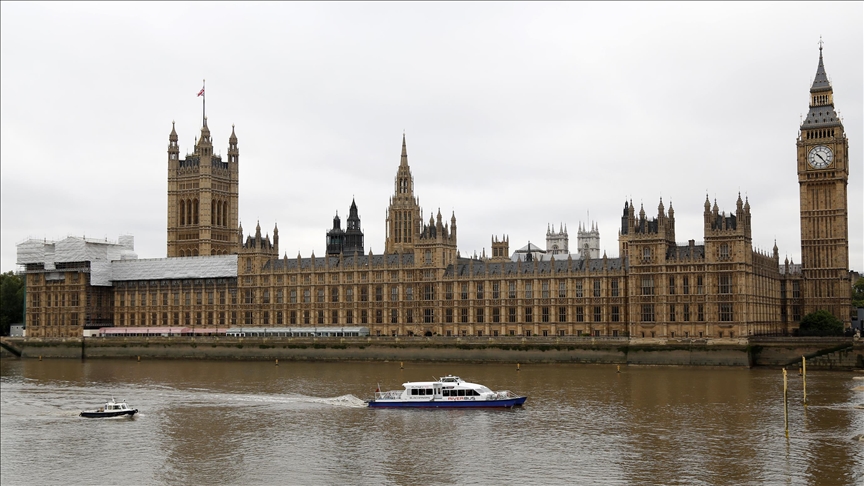'If you want them to disappear, stop arming Israel': UK Lords slam Palestine Action terror label
Peter Hain and Jenny Jones condemn government move, drawing parallels with anti-apartheid and suffragette struggles

LONDON
A heated debate erupted in the House of Lords on Thursday as peers discussed the government's decision to proscribe Palestine Action as a terrorist organization — a move that has drawn strong criticism from campaign veterans and civil liberties advocates.
Labour peer Peter Hain, a prominent anti-apartheid activist during the 1960s and 70s, expressed deep regret over his party’s support for the ban, warning that it echoes the vilification of past protest movements now celebrated for their moral courage.
'I would be stigmatized as a terrorist'
“If I was doing that today,” he said of his past activism, “I would be stigmatized as a terrorist, rather than vilified, as indeed I then was.”
Hain compared the banning of Palestine Action to past attempts to suppress the anti-apartheid movement, highlighting that actions such as disrupting Barclays Bank recruitment events eventually helped force the bank’s withdrawal from apartheid South Africa.
“That militant action could have been blocked by this motion as could other anti-apartheid activity,” he said.
Referring to Nelson Mandela, Hain reminded peers that the former South African president had been branded a terrorist by Western leaders including Margaret Thatcher and remained on the US terrorism watchlist until 2008 — long after receiving the Nobel Peace Prize and becoming his country’s first democratically elected leader.
“Mandela even remained on the US terrorism watchlist until 2008,” Hain said.
“After his African National Congress had been banned, Nelson Mandela was convicted for sabotage and conspiracy to overthrow the apartheid government when he backed armed struggle despite strongly opposing the very essence of terrorism: namely violent and indiscriminate attacks on innocent civilians.”
He also invoked the suffragettes, saying they too “could have been suppressed under this proscription” for their use of property damage in protest.
“They even hid small homemade bombs inside mailboxes and attempted to bomb Westminster Abbey and Prime Minister David Lloyd George’s uncompleted house,” Hain said. “Frankly Palestine Action members spraying paint on military aircraft at Brize Norton seems positively moderate by comparison.”
While acknowledging that those accused of criminal damage should be prosecuted under existing laws, Hain drew a sharp distinction between such offences and the acts of terrorist groups like al-Qaida or Islamic State.
“This government is treating Palestine Action as equivalent to Islamic State or al-Qaida, which is intellectually bankrupt, politically unprincipled and morally wrong,” he said.
Green Party peer Baroness Jenny Jones also opposed the proscription, introducing a regret motion — a parliamentary mechanism allowing the House to formally express disapproval of secondary legislation without blocking it.
The amendment, she explained, would register concern that the order banning Palestine Action undermines civil liberties, including civil disobedience, constitutes a misuse of anti-terrorism legislation, suppresses dissent against the UK’s policy on Israel, criminalizes support for a protest group, creating a chilling effect on freedom of expression.
Speaking in support of her motion, Jones rejected the comparison of Palestine Action with white supremacist groups such as the Russian Imperial Movement and Maniacs Murder Cult (MMC), which were also banned under the same order.
'If you want Palestine Action to disappear then stop sending arms to Israel'
“Palestine Action were not in the same category as this group,” she said.
She also criticized the broad definition of terrorism in the current legislation, which allows property damage to be treated as terrorism if it has the potential for a “devastating impact.”
But, she argued, this did not apply to Palestine Action. “Their activities have not involved a pattern for serious violence,” she said.
“If you want Palestine Action to disappear,” Jones added, “then stop sending arms to Israel and giving military support to a foreign government engaged in ethnic cleansing.” “There are many things Palestine Action has done I don’t agree with, but spraying paint on refueling planes that campaigners believe are used to help the ethnic cleansing in Gaza is not terrorism. It’s criminal damage, which we already have laws for."
Peers then voted on the government's decision to proscribe Palestine Action as a terrorist organization. The regret motion, which sought to formally condemn the ban, was defeated by 144 votes to 16. With the amendment rejected, the order to ban Palestine Action was passed.
The order to amend the Terrorism Act 2000 and proscribe the group was passed by the House of Commons on Wednesday by 385 votes to 26.








